Americanah: A Study of Identity, Race, Gender, and Nationality
VerifiedAdded on 2022/12/27
|6
|1344
|20
Essay
AI Summary
This essay analyzes Chimamanda Ngozi Adichie's novel, "Americanah," focusing on the intersection of race, gender, class, and nationality. The essay explores the experiences of Nigerian immigrants in America and Britain, highlighting the characters' encounters with racism, cultural differences, and the complexities of identity formation. The essay examines how the novel challenges perceptions of race and gender, and how geographic location influences societal perceptions. The essay discusses the themes of cultural integration, alienation, and the struggle for equality and empowerment, drawing on the characters' narratives and blog posts to illustrate these points. The analysis also considers the economic disparities and the impact of these factors on the characters' lives, providing a comprehensive overview of the novel's central themes and their relevance in a global context. The essay concludes by summarizing the key arguments and the novel's insights into the multifaceted nature of identity.
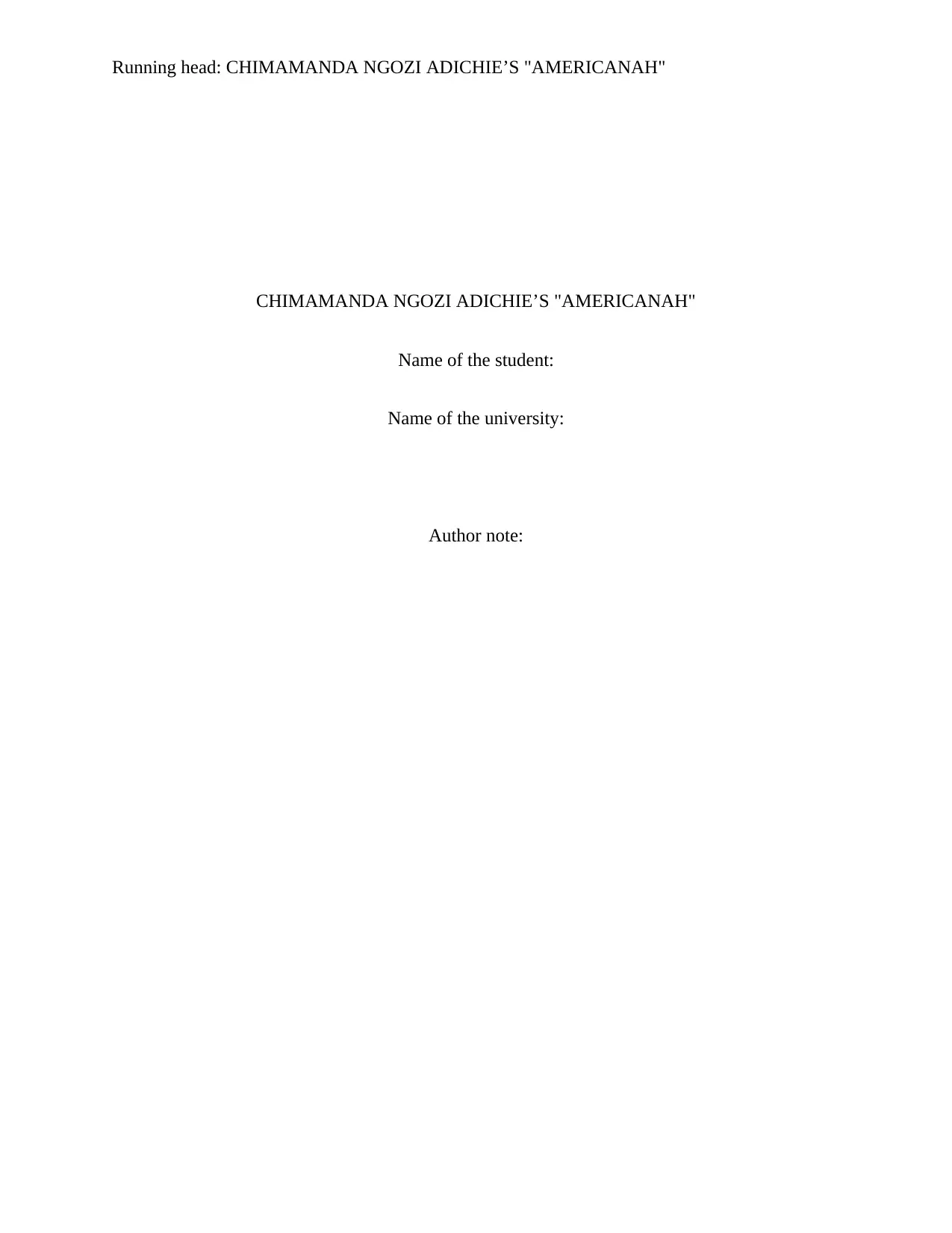
Running head: CHIMAMANDA NGOZI ADICHIE’S "AMERICANAH"
CHIMAMANDA NGOZI ADICHIE’S "AMERICANAH"
Name of the student:
Name of the university:
Author note:
CHIMAMANDA NGOZI ADICHIE’S "AMERICANAH"
Name of the student:
Name of the university:
Author note:
Paraphrase This Document
Need a fresh take? Get an instant paraphrase of this document with our AI Paraphraser
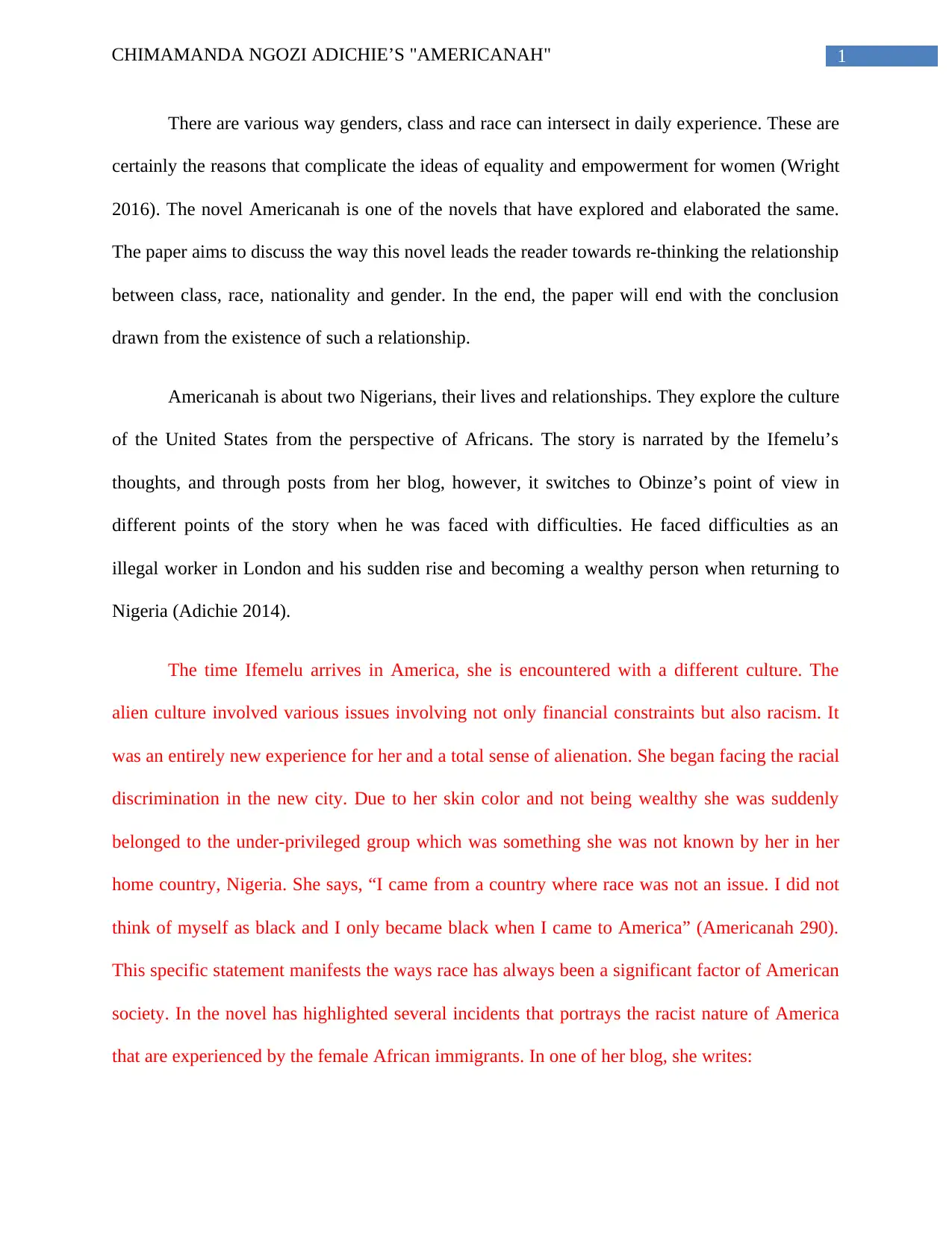
1CHIMAMANDA NGOZI ADICHIE’S "AMERICANAH"
There are various way genders, class and race can intersect in daily experience. These are
certainly the reasons that complicate the ideas of equality and empowerment for women (Wright
2016). The novel Americanah is one of the novels that have explored and elaborated the same.
The paper aims to discuss the way this novel leads the reader towards re-thinking the relationship
between class, race, nationality and gender. In the end, the paper will end with the conclusion
drawn from the existence of such a relationship.
Americanah is about two Nigerians, their lives and relationships. They explore the culture
of the United States from the perspective of Africans. The story is narrated by the Ifemelu’s
thoughts, and through posts from her blog, however, it switches to Obinze’s point of view in
different points of the story when he was faced with difficulties. He faced difficulties as an
illegal worker in London and his sudden rise and becoming a wealthy person when returning to
Nigeria (Adichie 2014).
The time Ifemelu arrives in America, she is encountered with a different culture. The
alien culture involved various issues involving not only financial constraints but also racism. It
was an entirely new experience for her and a total sense of alienation. She began facing the racial
discrimination in the new city. Due to her skin color and not being wealthy she was suddenly
belonged to the under-privileged group which was something she was not known by her in her
home country, Nigeria. She says, “I came from a country where race was not an issue. I did not
think of myself as black and I only became black when I came to America” (Americanah 290).
This specific statement manifests the ways race has always been a significant factor of American
society. In the novel has highlighted several incidents that portrays the racist nature of America
that are experienced by the female African immigrants. In one of her blog, she writes:
There are various way genders, class and race can intersect in daily experience. These are
certainly the reasons that complicate the ideas of equality and empowerment for women (Wright
2016). The novel Americanah is one of the novels that have explored and elaborated the same.
The paper aims to discuss the way this novel leads the reader towards re-thinking the relationship
between class, race, nationality and gender. In the end, the paper will end with the conclusion
drawn from the existence of such a relationship.
Americanah is about two Nigerians, their lives and relationships. They explore the culture
of the United States from the perspective of Africans. The story is narrated by the Ifemelu’s
thoughts, and through posts from her blog, however, it switches to Obinze’s point of view in
different points of the story when he was faced with difficulties. He faced difficulties as an
illegal worker in London and his sudden rise and becoming a wealthy person when returning to
Nigeria (Adichie 2014).
The time Ifemelu arrives in America, she is encountered with a different culture. The
alien culture involved various issues involving not only financial constraints but also racism. It
was an entirely new experience for her and a total sense of alienation. She began facing the racial
discrimination in the new city. Due to her skin color and not being wealthy she was suddenly
belonged to the under-privileged group which was something she was not known by her in her
home country, Nigeria. She says, “I came from a country where race was not an issue. I did not
think of myself as black and I only became black when I came to America” (Americanah 290).
This specific statement manifests the ways race has always been a significant factor of American
society. In the novel has highlighted several incidents that portrays the racist nature of America
that are experienced by the female African immigrants. In one of her blog, she writes:
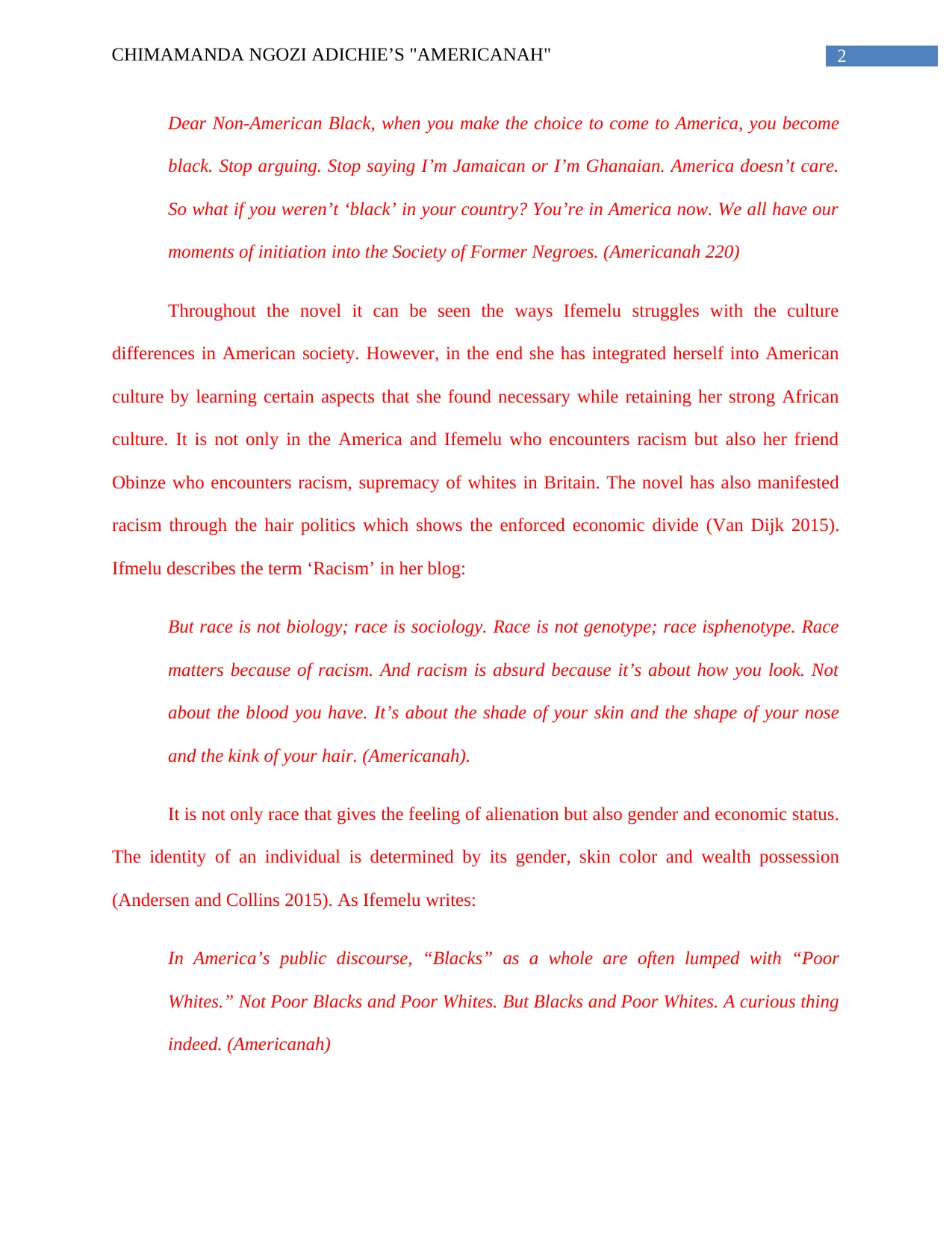
2CHIMAMANDA NGOZI ADICHIE’S "AMERICANAH"
Dear Non-American Black, when you make the choice to come to America, you become
black. Stop arguing. Stop saying I’m Jamaican or I’m Ghanaian. America doesn’t care.
So what if you weren’t ‘black’ in your country? You’re in America now. We all have our
moments of initiation into the Society of Former Negroes. (Americanah 220)
Throughout the novel it can be seen the ways Ifemelu struggles with the culture
differences in American society. However, in the end she has integrated herself into American
culture by learning certain aspects that she found necessary while retaining her strong African
culture. It is not only in the America and Ifemelu who encounters racism but also her friend
Obinze who encounters racism, supremacy of whites in Britain. The novel has also manifested
racism through the hair politics which shows the enforced economic divide (Van Dijk 2015).
Ifmelu describes the term ‘Racism’ in her blog:
But race is not biology; race is sociology. Race is not genotype; race isphenotype. Race
matters because of racism. And racism is absurd because it’s about how you look. Not
about the blood you have. It’s about the shade of your skin and the shape of your nose
and the kink of your hair. (Americanah).
It is not only race that gives the feeling of alienation but also gender and economic status.
The identity of an individual is determined by its gender, skin color and wealth possession
(Andersen and Collins 2015). As Ifemelu writes:
In America’s public discourse, “Blacks” as a whole are often lumped with “Poor
Whites.” Not Poor Blacks and Poor Whites. But Blacks and Poor Whites. A curious thing
indeed. (Americanah)
Dear Non-American Black, when you make the choice to come to America, you become
black. Stop arguing. Stop saying I’m Jamaican or I’m Ghanaian. America doesn’t care.
So what if you weren’t ‘black’ in your country? You’re in America now. We all have our
moments of initiation into the Society of Former Negroes. (Americanah 220)
Throughout the novel it can be seen the ways Ifemelu struggles with the culture
differences in American society. However, in the end she has integrated herself into American
culture by learning certain aspects that she found necessary while retaining her strong African
culture. It is not only in the America and Ifemelu who encounters racism but also her friend
Obinze who encounters racism, supremacy of whites in Britain. The novel has also manifested
racism through the hair politics which shows the enforced economic divide (Van Dijk 2015).
Ifmelu describes the term ‘Racism’ in her blog:
But race is not biology; race is sociology. Race is not genotype; race isphenotype. Race
matters because of racism. And racism is absurd because it’s about how you look. Not
about the blood you have. It’s about the shade of your skin and the shape of your nose
and the kink of your hair. (Americanah).
It is not only race that gives the feeling of alienation but also gender and economic status.
The identity of an individual is determined by its gender, skin color and wealth possession
(Andersen and Collins 2015). As Ifemelu writes:
In America’s public discourse, “Blacks” as a whole are often lumped with “Poor
Whites.” Not Poor Blacks and Poor Whites. But Blacks and Poor Whites. A curious thing
indeed. (Americanah)
⊘ This is a preview!⊘
Do you want full access?
Subscribe today to unlock all pages.

Trusted by 1+ million students worldwide
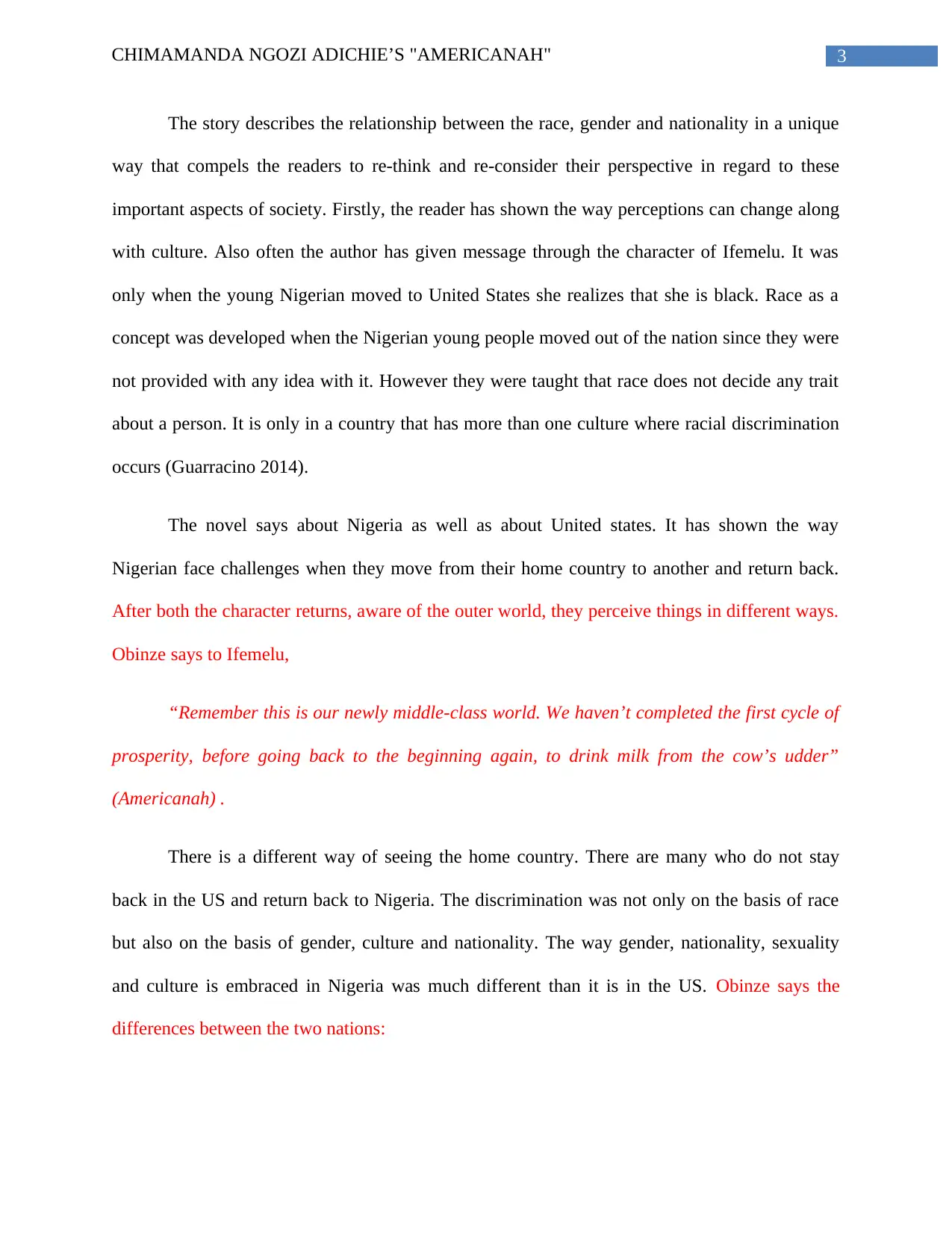
3CHIMAMANDA NGOZI ADICHIE’S "AMERICANAH"
The story describes the relationship between the race, gender and nationality in a unique
way that compels the readers to re-think and re-consider their perspective in regard to these
important aspects of society. Firstly, the reader has shown the way perceptions can change along
with culture. Also often the author has given message through the character of Ifemelu. It was
only when the young Nigerian moved to United States she realizes that she is black. Race as a
concept was developed when the Nigerian young people moved out of the nation since they were
not provided with any idea with it. However they were taught that race does not decide any trait
about a person. It is only in a country that has more than one culture where racial discrimination
occurs (Guarracino 2014).
The novel says about Nigeria as well as about United states. It has shown the way
Nigerian face challenges when they move from their home country to another and return back.
After both the character returns, aware of the outer world, they perceive things in different ways.
Obinze says to Ifemelu,
“Remember this is our newly middle-class world. We haven’t completed the first cycle of
prosperity, before going back to the beginning again, to drink milk from the cow’s udder”
(Americanah) .
There is a different way of seeing the home country. There are many who do not stay
back in the US and return back to Nigeria. The discrimination was not only on the basis of race
but also on the basis of gender, culture and nationality. The way gender, nationality, sexuality
and culture is embraced in Nigeria was much different than it is in the US. Obinze says the
differences between the two nations:
The story describes the relationship between the race, gender and nationality in a unique
way that compels the readers to re-think and re-consider their perspective in regard to these
important aspects of society. Firstly, the reader has shown the way perceptions can change along
with culture. Also often the author has given message through the character of Ifemelu. It was
only when the young Nigerian moved to United States she realizes that she is black. Race as a
concept was developed when the Nigerian young people moved out of the nation since they were
not provided with any idea with it. However they were taught that race does not decide any trait
about a person. It is only in a country that has more than one culture where racial discrimination
occurs (Guarracino 2014).
The novel says about Nigeria as well as about United states. It has shown the way
Nigerian face challenges when they move from their home country to another and return back.
After both the character returns, aware of the outer world, they perceive things in different ways.
Obinze says to Ifemelu,
“Remember this is our newly middle-class world. We haven’t completed the first cycle of
prosperity, before going back to the beginning again, to drink milk from the cow’s udder”
(Americanah) .
There is a different way of seeing the home country. There are many who do not stay
back in the US and return back to Nigeria. The discrimination was not only on the basis of race
but also on the basis of gender, culture and nationality. The way gender, nationality, sexuality
and culture is embraced in Nigeria was much different than it is in the US. Obinze says the
differences between the two nations:
Paraphrase This Document
Need a fresh take? Get an instant paraphrase of this document with our AI Paraphraser
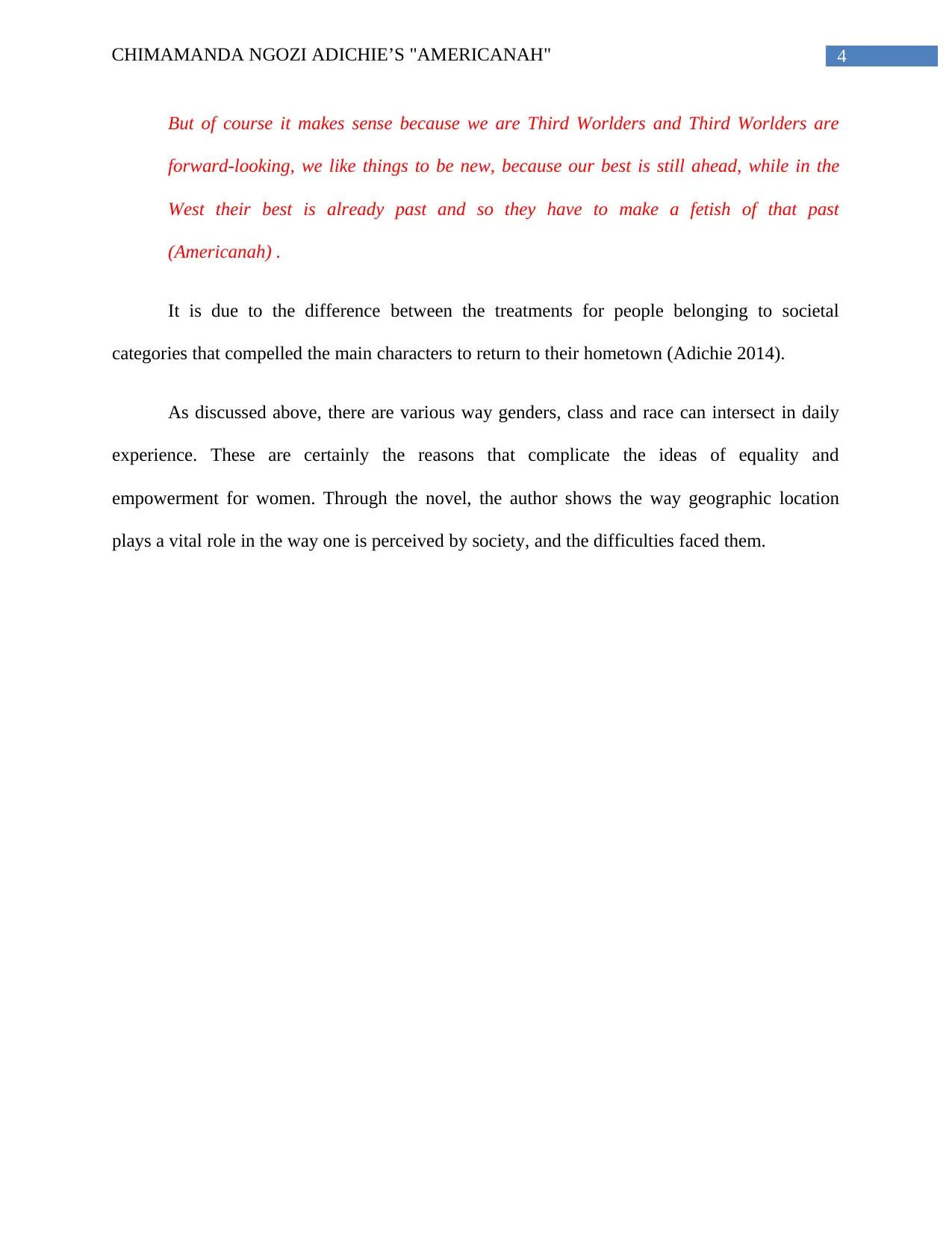
4CHIMAMANDA NGOZI ADICHIE’S "AMERICANAH"
But of course it makes sense because we are Third Worlders and Third Worlders are
forward-looking, we like things to be new, because our best is still ahead, while in the
West their best is already past and so they have to make a fetish of that past
(Americanah) .
It is due to the difference between the treatments for people belonging to societal
categories that compelled the main characters to return to their hometown (Adichie 2014).
As discussed above, there are various way genders, class and race can intersect in daily
experience. These are certainly the reasons that complicate the ideas of equality and
empowerment for women. Through the novel, the author shows the way geographic location
plays a vital role in the way one is perceived by society, and the difficulties faced them.
But of course it makes sense because we are Third Worlders and Third Worlders are
forward-looking, we like things to be new, because our best is still ahead, while in the
West their best is already past and so they have to make a fetish of that past
(Americanah) .
It is due to the difference between the treatments for people belonging to societal
categories that compelled the main characters to return to their hometown (Adichie 2014).
As discussed above, there are various way genders, class and race can intersect in daily
experience. These are certainly the reasons that complicate the ideas of equality and
empowerment for women. Through the novel, the author shows the way geographic location
plays a vital role in the way one is perceived by society, and the difficulties faced them.
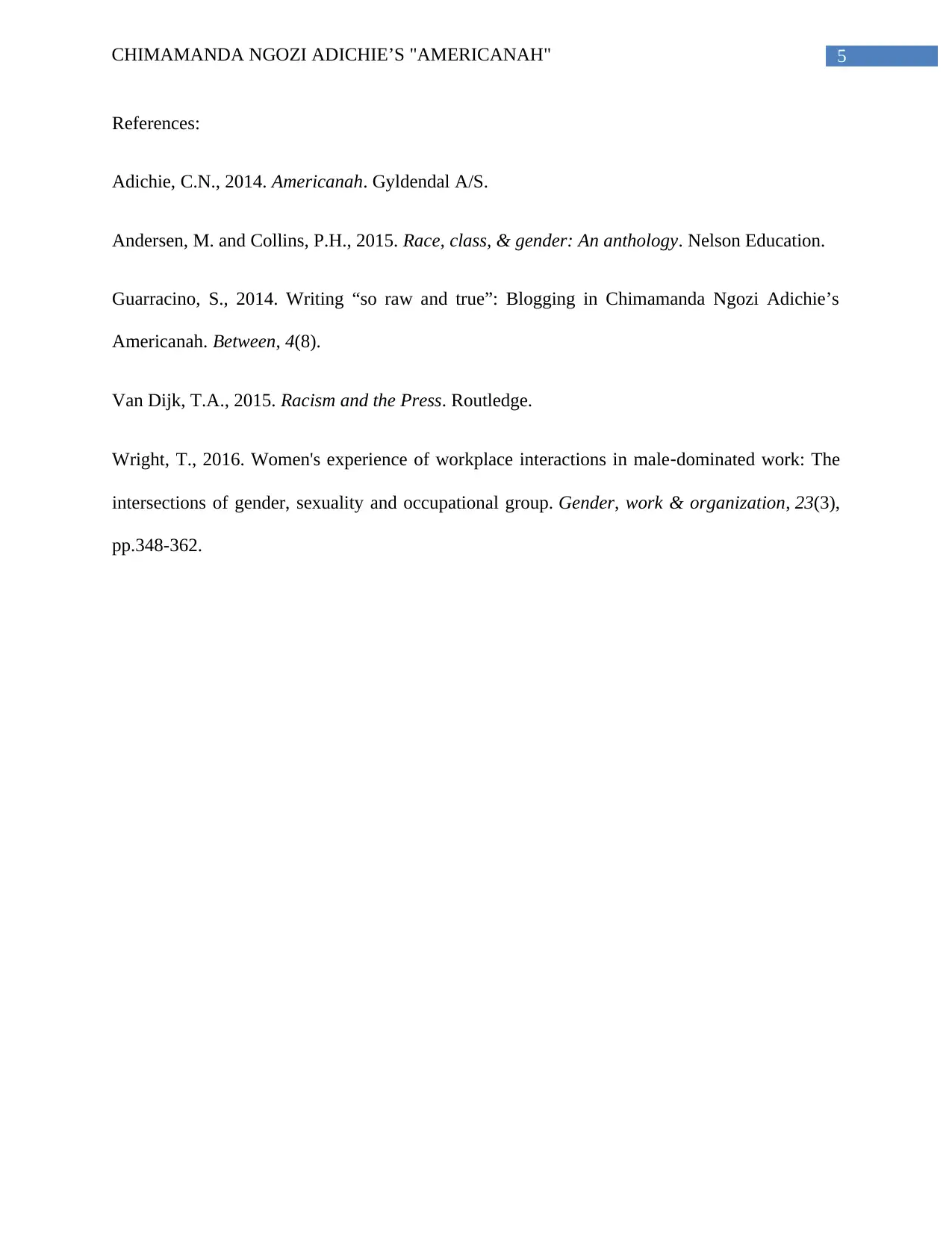
5CHIMAMANDA NGOZI ADICHIE’S "AMERICANAH"
References:
Adichie, C.N., 2014. Americanah. Gyldendal A/S.
Andersen, M. and Collins, P.H., 2015. Race, class, & gender: An anthology. Nelson Education.
Guarracino, S., 2014. Writing “so raw and true”: Blogging in Chimamanda Ngozi Adichie’s
Americanah. Between, 4(8).
Van Dijk, T.A., 2015. Racism and the Press. Routledge.
Wright, T., 2016. Women's experience of workplace interactions in male‐dominated work: The
intersections of gender, sexuality and occupational group. Gender, work & organization, 23(3),
pp.348-362.
References:
Adichie, C.N., 2014. Americanah. Gyldendal A/S.
Andersen, M. and Collins, P.H., 2015. Race, class, & gender: An anthology. Nelson Education.
Guarracino, S., 2014. Writing “so raw and true”: Blogging in Chimamanda Ngozi Adichie’s
Americanah. Between, 4(8).
Van Dijk, T.A., 2015. Racism and the Press. Routledge.
Wright, T., 2016. Women's experience of workplace interactions in male‐dominated work: The
intersections of gender, sexuality and occupational group. Gender, work & organization, 23(3),
pp.348-362.
⊘ This is a preview!⊘
Do you want full access?
Subscribe today to unlock all pages.

Trusted by 1+ million students worldwide
1 out of 6
Related Documents
Your All-in-One AI-Powered Toolkit for Academic Success.
+13062052269
info@desklib.com
Available 24*7 on WhatsApp / Email
![[object Object]](/_next/static/media/star-bottom.7253800d.svg)
Unlock your academic potential
Copyright © 2020–2026 A2Z Services. All Rights Reserved. Developed and managed by ZUCOL.



